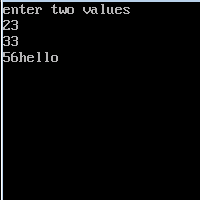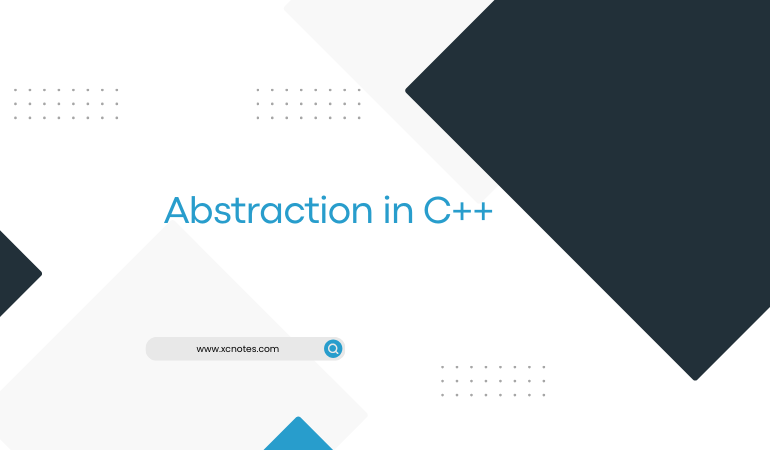Abstraction is one of the fundamental principles of object-oriented programming (OOP), and it plays a crucial role in C++. Abstraction involves simplifying complex systems by modeling classes based on the essential features they possess while hiding unnecessary details. In C++, abstraction is implemented through classes and interfaces.
Here are some key concepts related to abstraction in C++:
Classes and Objects:
Class: A class is a blueprint for creating objects(class Car). It defines a data structure along with functions (methods) that can operate on that data. It encapsulates the data and methods within a single unit.
Object: An object is an instance of a class(Car car1). It represents a real-world entity and encapsulates both data and the methods that operate on the data.
Example:
// Class definition
class Car {
private:
// Data members
string brand;
int year;
public:
// Member functions
void setBrand(string b) {
brand = b;
}
void setYear(int y) {
year = y;
}
void displayInfo() {
cout << “Brand: ” << brand << “, Year: ” << year << endl;
}
};
// Creating objects
Car car1;
car1.setBrand(“Toyota”);
car1.setYear(2022);
car1.displayInfo();
Encapsulation:
Encapsulation is the bundling of data and the methods that operate on that data into a single unit (class). It helps in hiding the internal details of an object and exposing only what is necessary.
Abstraction through Interfaces:
Interfaces define a contract for classes that implement them. They specify a set of methods that the implementing classes must provide, without detailing how those methods are implemented.
Example:
// Interface definition
class Printable {
public:
virtual void print() = 0; // Pure virtual function
};
// Class implementing the interface
class ConcretePrintable : public Printable {
public:
void print() override {
cout << “Printing from ConcretePrintable” << endl;
}
};
Abstract Classes in C++
An abstract class is a class that cannot be instantiated on its own and may contain one or more pure virtual functions. It serves as a base class for other classes and provides a common interface.
Example of Abstract class:
class Shape {
public:
virtual void draw() = 0; // Pure virtual function
};
// Concrete class
class Circle : public Shape {
public:
void draw() override {
cout << “Drawing a circle” << endl;
}
};
In summary, abstraction in C++ involves creating classes to model real-world entities, encapsulating their data and behavior, using interfaces to define contracts, and sometimes using abstract classes to provide common functionality. This abstraction allows for the creation of modular and maintainable code by hiding implementation details and focusing on essential features.
Example of Abstraction in C++
#include<iostream.h>
#include<conio.h>
class abc
{
public:
int n1,n2,n3,n4,n5;
void show()
{
cout<<“hello”;
}
};
main()
{
abc ob1;
clrscr();
cout<<“enter two values”;
cin>>ob1.n1>>ob1.n2;
ob1.n3=ob1.n1+ob1.n2;
cout<<ob1.n3;
ob1.show();
getch();
}

Advantages of Abstraction in C++:
Modularity:
Advantage: Abstraction allows for the creation of modular and reusable code. Each class or module can be developed and tested independently, leading to more maintainable and scalable software.
Encapsulation:
Advantage: Abstraction facilitates encapsulation, which means bundling the data and methods that operate on that data into a single unit. This helps in hiding the internal details of an object and protecting its state from external interference.
Code Reusability:
Advantage: Abstraction promotes code reusability. Once a class or module is defined, it can be used in different parts of the program or different programs altogether, reducing the need to rewrite code.
Readability and Understandability:
Advantage: Abstraction enhances code readability and understandability by allowing developers to focus on high-level concepts and ignore unnecessary details. This makes the code more comprehensible and easier to maintain.
Ease of Maintenance:
Advantage: Abstraction simplifies maintenance tasks. If changes are needed, developers can focus on the interface provided by a class or module without worrying about the internal implementation details, reducing the likelihood of introducing errors.
Polymorphism:
Advantage: Abstraction supports polymorphism, allowing objects of different classes to be treated uniformly through interfaces or base classes. This facilitates flexibility and extensibility in the code.
Security:
Advantage: Abstraction enhances security by controlling access to the internal details of an object. Private members and methods can be hidden, preventing unintended manipulation or interference.
Disadvantages of Abstraction in C++:
Performance Overhead:
Disadvantage: Abstraction, especially in the form of virtual functions and polymorphism, can introduce a performance overhead compared to direct function calls. Virtual function calls involve dynamic dispatch, which can be slower than static dispatch.
Complexity:
Disadvantage: Overuse of abstraction can lead to unnecessary complexity. While abstraction simplifies high-level views, it can also make the code harder to understand if the number of abstractions and layers becomes excessive.
Learning Curve:
Disadvantage: Understanding and working with abstract concepts and interfaces may have a learning curve, especially for beginners. Novice programmers might find it challenging to grasp the relationships between various classes and interfaces.
Overhead in Small Projects:
Disadvantage: In small projects or projects with simple requirements, introducing excessive abstraction might be unnecessary and can lead to additional development time without corresponding benefits.
Debugging Challenges:
Disadvantage: When debugging, it may be challenging to trace through multiple layers of abstraction to identify the root cause of a problem. This can make debugging more time-consuming

